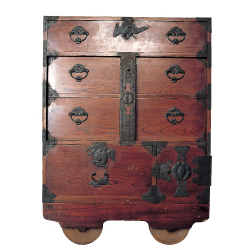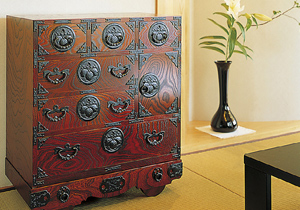 The history of Iwayadō Tansu begins in the twelfth century, when the lord of nearby regional power Hiraizumi began a program to promote local industries. The first products produced were not the chests of drawers now famous as Iwayadō Tansu, but are believed to have been large storage chests (nagamochi).
The history of Iwayadō Tansu begins in the twelfth century, when the lord of nearby regional power Hiraizumi began a program to promote local industries. The first products produced were not the chests of drawers now famous as Iwayadō Tansu, but are believed to have been large storage chests (nagamochi).
In the 1780s, hoping to alleviate the local economy’s dependency on rice, the lord of Iwayadō Castle commissioned a retainer to study woodworking and lacquering techniques and to produce wheeled chests.
Sometime around the 1820s, the distinctive metal fittings and lockplates were added. In the two centuries since, the skilled craftsmen of Iwayadō have continued this proud tradition.
Chests of drawers became a common household item after the middle of the nineteenth century, and this development resulted was a major boon for Iwayadō Tansu. The beautiful lacquer finish and fine repoussé and chased fittings of Iwayadō Tansu were wildly popular, and the chests were shipped via the Kitakami River to points around Tōhoku.
 Despite a production slump after World War II, the craftsmen of Iwayadō protected their proud tradition, understanding that this was the true path to the future. As Japan’s economy grew in the 1960s, interest in traditional crafts and furniture was rekindled. A mid-1960s exhibition at a Tokyo department store proved to be a major turning point in the modern fortunes of Iwayadō Tansu, which became quite popular in the Tokyo metropolitan area.
Despite a production slump after World War II, the craftsmen of Iwayadō protected their proud tradition, understanding that this was the true path to the future. As Japan’s economy grew in the 1960s, interest in traditional crafts and furniture was rekindled. A mid-1960s exhibition at a Tokyo department store proved to be a major turning point in the modern fortunes of Iwayadō Tansu, which became quite popular in the Tokyo metropolitan area.
In 1967, the Iwayadō Tansu Production Union was formed by local producers in the Esashi area. Four years later, a Morioka producer joined the Union, which was renamed the Iwayadō Tansu Production Cooperative. Then in 1982, after a rigorous vetting process, Iwayadō Tansu were designated by the Japanese government as a Traditional Craft Product.
Iwayadō Tansu are artistic furnishings for contemporary life. Their superlative craftsmanship is a popular accouterment even with urban condo and apartment residents. “Tansu” refers specifically to chests of drawers, but we now also produce other furniture using the same materials and time-honored techniques. These furnishings are distributed around Japan by local product wholesaler Iwate Kensan, and enjoy an outstanding reputation as traditional Japanese craft furniture.
